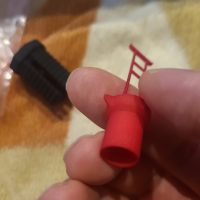Where can I find the radio module data sheets ?
Hi there,
I am considering applying for technical conformance to use Cyton in Japan.
Looking at past forums, I found the statement
"No emissions outside regulated bands. All the OpenBCI devices use FCC / CE compliant wireless devices."
https://openbci.com/forum/index.php?p=/discussion/2682/are-ganglion-and-cyton-certified-by-japans-telec
Looking at Cyton's documentation, it also seems to use the RFduino BLE radio module.
https://docs.openbci.com/Cyton/CytonSpecs/#openbci-cyton-board
Cyton says that it complies with FCC / CE and other standards, but I am not sure if I am correct in assuming that it is not actually approved by them?
Also, would it be possible to receive a detailed datasheet on this radio module, such as frequency bands, transmit power, etc?
Thank you for helping.


Comments
There are already OpenBCI users in Japan. You do not need to apply for "technical conformance". The radio modules already have FCC / CE compliance. That is all you should need for most circumstances. FCC / CE has tested the radio modules used, to confirm that they do not emit outside the regulated bands. (Bluetooth in this case.) So yes this is "approval" by those agencies. The modules were produced by RF Digital.
https://www.google.com/search?q=rfduino+datasheet
https://cdn.sparkfun.com/datasheets/Dev/RFduino/rfduino.datasheet.pdf
Thanks for the comment.
The Cyton product page states the following:
"This evaluation board/kit does not fall within the scope of the European Union directives regarding electromagnetic compatibility, restricted substances (RoHS), recycling (WEEE), FCC, CE or UL, and therefore may not meet the technical requirements of these directives or other related directives."
Do you mean to say that this information is out of date and incorrect?
I understand that there are already a certain number of OpenBCI users in Japan, but whether they are using it legally is another story.
It is legally prohibited to import equipment that has undergone conformity assessment under overseas standards (such as equipment with CE or FCC marks affixed) and use it in Japan as is. (We believe that many people actually do this in Japan).
Even if the product complies with FCC / CE, it is required to obtain technical conformity and special application under the Japanese Radio Law. As far as I can find, the RFduino itself is not technically qualified in Japan.
(I can't find it, at least not in articles in Japanese)
Therefore, I would like to know the IDs obtained from FCC and CE and the URLs that prove them, because I would like to recommend approval in Japan based on the registration information there if it has been officially approved overseas.
https://apps.fcc.gov/cores/userLogin.do
As I mentioned before, the radio modules (RFduino on Cyton / dongle and Simblee / BLED112 for Ganglion) are the ONLY components that ARE certified with the FCC and CE. They certify that Bluetooth emissions are within the regulated bands used in (I believe) all countries, including Europe and US.
OTHER CE certifications exist, as the quote you mentioned from the product page regarding electromagnetic fields from the board itself (CPU, etc.), recycling, RoHS, etc. As mentioned the primary certification most countries would be insisting on, is to not interfere with other Bluetooth radio usage. And this has indeed been certified.
If you have further questions, you should email customer service (contact at openbci.com). You may not know this, but "regulatory approval" by government agencies generally requires large expenditures and expensive lab testing. The Bluetooth modules used already have approval. Getting approval for other board components may be prohibitively expensive on your part.
https://www.google.com/search?q=cost+for+telec+certification
https://www.google.com/search?q=cost+for+giteki+certification
https://www.gmcompliance.com/japan-telec-certification-service/
The FCC and CE are not Japanese standards, so their rules do not apply as they are.
Whether it is FCC or CE compliant and whether it can be used in Japan are two completely different things.
Also, just to let you know that you may be mistaken, TELEC is just one of the time periods to go through certification.
(I'm afraid you were mistaken in the following article as well.)
https://openbci.com/forum/index.php?p=/discussion/2682/are-ganglion-and-cyton-certified-by-japans-telec
RFduino has NOT BEEN CONFORMED by all of its agencies to have obtained Japanese technical certification.(As far as I know, that's why I asked the question here.)
Therefore, it is a firm fact that Openbci products, although there are several in circulation in Japan, have not yet reached the stage of hardware service for open use.
This is because it would be illegal to turn them on except under limited circumstances.
That is why we need to submit the information gathered from the data sheet in order to go on using this product more actively.
Also, since you don't seem to know, I have to tell you.
In Japan, a special system may make it legal to use a product without the usual approval. And there is no cost to apply for such approval. Therefore, the cost issue you are concerned about is not a concern in this use case.
The google search results page you gave me unfortunately did not work usefully for me. (for other people's reference).
I will try to examine the Japanese technical application for RFduino based on the datasheet.
Also, the above statement on this page is misleading and should be corrected. At the very least, the term ''TELEC qualified'' is not common at all.
https://shop.openbci.com/products/ganglion-dongle
You may be overthinking this issue.
It would make sense if you are anticipating selling your modified OpenBCI-based system "at scale", say dozens or hundreds of units. But if you are only making a few of these, why make things more complicated for yourself?? Surely the Japanese regulations you cite, are intended for corporations which intend to sell hundreds to thousands of units.
I do believe that if you compared the Bluetooth emissions standards worldwide, you would find them in agreement in all countries. As it is a universal, worldwide standard.
https://www.google.com/search?q=bluetooth+standardization
Please email contact at openbci.com for further advice. I've given you all the help I can at this point.
Regards, William Croft, OpenBCI Forum Admin